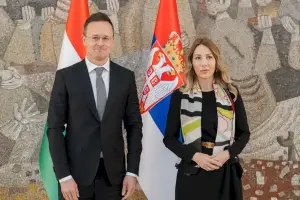- Serbia
Get to know Serbia
- Citizens
Culture and science
Health services
Pension and disability insurance
- Business
Employment
Economy
- Media
- Government
- Contact
Keep in touch
Contact form
Back
Keepin touch
Whether you have a question, comment, suggestion or any problem in the purview of the government, send us your message and we will try to respond as soon as possible. If your problem is not in our purview, we will forward your message to the relevant institution.
Q:
A:
Privatisation Agency receives €6.5 million donation
Belgrade,
3 November 2005
The European Agency for Reconstruction (EAR) granted to Serbia today a €6.5 million non-repayable grant for the continuation and acceleration of the privatisation process in the country. The grant will be administered by the World Bank, while its beneficiary will be the Serbian Privatisation Agency.
The contract on donation was signed by head of the EAR Office in Serbia-Montenegro Daniel Giuglaris, head of the World Bank Office in Serbia-Montenegro Carolyn Jungr, Serbian Minister of Economy Predrag Bubalo and Director of the Serbian Privatisation Agency Miodrag Djordjevic.
Bubalo said that the EU donation has come at the right moment to enable the completion of the privatisation process in Serbia by 2007.
The director of the Privatisation Agency said that the money will be spent on preparing the privatisation of another 30 Serbian companies and attracting strategic investors, as well as financing technical help and services of a privatisation adviser and restructuring companies.
Djordjevic stressed that this project, whose initial results will be visible in late 2006, is a result of close cooperation between EAR, the World Bank, Serbian ministries of Economy and Finance and the Serbian Privatisation Agency.
Giuglaris said that this donation is another step forward in the EU’s support to Serbia in the process of transition towards a market economy and European integration.
He recalled that the EU, through the EAR, has assisted Serbia in the process of privatisation since July 2001, when the Privatisation Agency was founded.
According to Giuglaris, in 2001 EAR provided nearly €1 million for restructuring three socially owned companies who have developed a close partnership with the Bank Rehabilitation Agency, while in 2002, €4 million was provided for the drawing up of a plan for restructuring ten large socially owned companies in the metals and chemicals industries.
As Giuglaris said, the donations for the year 2003 totalled nearly €4.3 million, and the Privatisation Agency is obliged to spend them before April 2006.
The changes introduced in May 2005 to the Law on privatisation were principal prerequisites for the new EAR donation to support further restructuring of socially owned companies, which is a necessary process if the country wants to attract a larger inflow of money through foreign direct investment, and in that way reduces budgetary expenditure for subsidising large enterprises, said the head of the EAR Office in Serbia-Montenegro.
Jungr recalled that the World Bank has taken part in the privatisation process in Serbia since its inception in 2001, and that it has so far granted $20 million for technical help, 50 percent of it in the form of donations.
Jungr pointed out that the privatisation process in Serbia can be compared in a positive sense to other transitional economies and that huge progress has been made, but still, a lot remains to be done.
Bubalo said that the EU donation has come at the right moment to enable the completion of the privatisation process in Serbia by 2007.
The director of the Privatisation Agency said that the money will be spent on preparing the privatisation of another 30 Serbian companies and attracting strategic investors, as well as financing technical help and services of a privatisation adviser and restructuring companies.
Djordjevic stressed that this project, whose initial results will be visible in late 2006, is a result of close cooperation between EAR, the World Bank, Serbian ministries of Economy and Finance and the Serbian Privatisation Agency.
Giuglaris said that this donation is another step forward in the EU’s support to Serbia in the process of transition towards a market economy and European integration.
He recalled that the EU, through the EAR, has assisted Serbia in the process of privatisation since July 2001, when the Privatisation Agency was founded.
According to Giuglaris, in 2001 EAR provided nearly €1 million for restructuring three socially owned companies who have developed a close partnership with the Bank Rehabilitation Agency, while in 2002, €4 million was provided for the drawing up of a plan for restructuring ten large socially owned companies in the metals and chemicals industries.
As Giuglaris said, the donations for the year 2003 totalled nearly €4.3 million, and the Privatisation Agency is obliged to spend them before April 2006.
The changes introduced in May 2005 to the Law on privatisation were principal prerequisites for the new EAR donation to support further restructuring of socially owned companies, which is a necessary process if the country wants to attract a larger inflow of money through foreign direct investment, and in that way reduces budgetary expenditure for subsidising large enterprises, said the head of the EAR Office in Serbia-Montenegro.
Jungr recalled that the World Bank has taken part in the privatisation process in Serbia since its inception in 2001, and that it has so far granted $20 million for technical help, 50 percent of it in the form of donations.
Jungr pointed out that the privatisation process in Serbia can be compared in a positive sense to other transitional economies and that huge progress has been made, but still, a lot remains to be done.
-
 Belgrade, 19 January 2026
Belgrade, 19 January 2026Deal reached on key provisions of NIS sale and purchase agreement
-
 Belgrade, 16 January 2026
Belgrade, 16 January 2026More than one-third of Growth Plan funds directed to energy sector
-
 Belgrade, 15 January 2026
Belgrade, 15 January 2026Goal to finalise NIS negotiations by end of week
-
 Belgrade, 23 December 2025
Belgrade, 23 December 2025Enhancing implementation of IPARD III programme
-
 Belgrade, 12 December 2025
Belgrade, 12 December 2025Construction of gas interconnector with North Macedonia by end-2027
-
 Belgrade, 8 December 2025
Belgrade, 8 December 2025Enormous public interest in registering illegal facilities
-
 Belgrade, 8 December 2025
Belgrade, 8 December 2025State doing everything to preserve stability of energy supplies
-
 Belgrade, 5 December 2025
Belgrade, 5 December 2025State doing everything to avoid shortage of oil derivatives
-
 Belgrade, 2 December 2025
Belgrade, 2 December 2025Serbia has not received positive decision from US over NIS
-
 Belgrade, 2 December 2025
Belgrade, 2 December 2025Spanish companies invited to invest in Serbian agriculture

